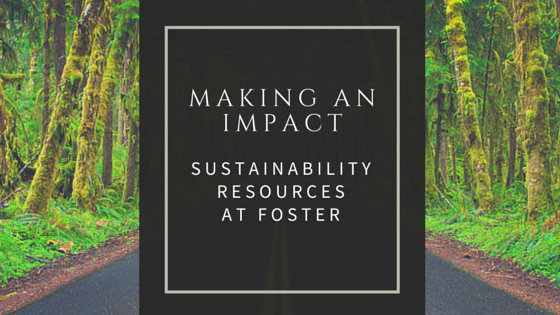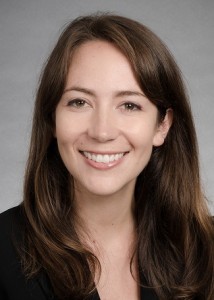Making an Impact: Sustainability Resources at Foster
Interested in using your MBA experience to be a force for social good? It’s my pleasure to introduce this guest post by Phoebe Lipkis (Class of 2016), our 2015-2016 Net Impact Club President. She’s a truly inspired leader and an amazing classmate. This is her guide on all the resources available to Foster MBA students who are interested in maximizing their social impact.
 The Pacific Northwest is a hotbed of social entrepreneurs, environmentalists, outdoor enthusiasts, and do-gooders. New Foster students looking to use their MBAs for social or environmental good will find an abundance of resources at their fingertips. Here’s a guide to make it easier for you to navigate these resources and create new opportunities.
The Pacific Northwest is a hotbed of social entrepreneurs, environmentalists, outdoor enthusiasts, and do-gooders. New Foster students looking to use their MBAs for social or environmental good will find an abundance of resources at their fingertips. Here’s a guide to make it easier for you to navigate these resources and create new opportunities.
Net Impact Club Resources
The mission of the Net Impact Club is to inspire, educate, and equip individuals to use the power of business to create a more socially and environmentally sustainable world.
- The Net Impact Conference is the leading forum for students and professionals who want to tackle the world’s toughest social and environmental problems. Autumn
- Net Impact Case Competition: This competition, held by the University of Colorado Boulder, is the premier Net Impact case competition. Applications are typically due in late November and the final round in Colorado occurs in January or February. Autumn/Winter
- Net Impact Service Corps: The chapter hosts Service Corps projects during the winter quarter that connect teams of Foster students to local non profits looking for management consulting expertise. Each team gets an advisor from a management consulting firm (Deloitte, McKinsey, etc.) and they work with organizations that have been identified and vetted by local organization, Social Venture Partners. Winter
- Ongoing Net Impact events, tours, meetings, and symposia. Join the Net Impact Club to get announcements! Autumn/Winter/Spring
Foster Resources
- Foster’s core sustainability class is “Cases in Sustainability” with Professor Elizabeth Stearns, and is typically offered in the Winter quarter. An “Impact Entrepreneurship” course was offered recently as well, and may return! For additional class offerings, look below at UW Resources.
- The Applied Strategy Project is a core curriculum requirement that first years do during the second quarter. Students get to choose to do consulting projects for various companies, and there are usually opportunities to help non-profits or local companies do social good. Winter
- The Board Fellows Program places MBA and MPA students as non-voting board members of local nonprofit organizations. Autumn/Winter/Spring
- The Burke Center for Entrepreneurship offers tons of resources for MBA students, including the Entrepreneurship Certificate. One of the coolest things they do is give stipends to students who wish to work with non-profits over the summer through the Social Entrepreneurship Summer Fellowship program.
- The Environmental Innovation Challenge is a fun, cross-disciplinary challenge that brings together students from across UW schools to innovate and help solve some of the world’s most pressing challenges. Autumn/Winter
- The Foster D-Prize is a competition for those who want to launch a new social enterprise in the developing world. Each team needs to have at least one Foster MBA student! Winter
- In your second year, the Global Consulting Project offers students with an interest in international business and social impact to get overseas experience. The students get to work on the ground in India with Self-Employed Women’s Association (SEWA) – a well-respected organization in India that supports women’s businesses. Autumn/Winter
- Other clubs with overlapping missions include the Healthcare and Biotech Club and the Outdoor and Sports Industry Club.
University of Washington Resources
- Non Profit Management Certificate (in partnership with the Evans School of Public Affairs)
- Environmental Management Certificate (in partnership with the Program on the Environment)
- Check out class listings at the Evans School, School of Public Health, School of Social Work, School of the Environment, or other schools at UW. Full-time MBA students can take up to 4 classes (16 credits) outside of Foster. Talk to second years to find out which classes offer the most value.
- UW Office of Sustainability has tons of university-wide information, including course lists and a mailing list.
- Check out UW’s very own farm that sources to its own farm-to-table restaurant, Cultivate, and runs an annual Community Supported Agriculture (CSA) program from June to October.
Community Resources
Seattle has TONS of people, organizations, and resources for people interested in social impact. Here are just a few to fuel your search:
- Social Venture Partners (SVP has strong ties to Foster…connections and introductions available.)
- Impact Hub Seattle
- The Bill and Melinda Gates Foundation is based in Seattle and offers internships and other opportunities to engage, including a summer internship, Global Innovation Fellows, and more!
Most importantly, make sure that you are pursuing opportunities that are meaningful for you and your career. Find something that interests you and go for it. Good luck!
Let’s hear from you – what other resources would you recommend?
About the Author:
 Phoebe Lipkis is delighted to be back in school after 8 years in nonprofit leadership roles in New York, London, Minneapolis, Louisville, and Los Angeles. At Foster, she is focused on leveraging economics, organizational behavior, strategy, and leadership for social and environmental change. Most recently she worked with public utilities in Los Angeles to create a shared plan for stormwater management for the region. As the Director of Development for an anti-violence organization, she led major strategic planning, change initiatives, and fundraising campaigns. Phoebe grew up in Los Angeles, and received her BA in Psychology from UC Santa Cruz.
Phoebe Lipkis is delighted to be back in school after 8 years in nonprofit leadership roles in New York, London, Minneapolis, Louisville, and Los Angeles. At Foster, she is focused on leveraging economics, organizational behavior, strategy, and leadership for social and environmental change. Most recently she worked with public utilities in Los Angeles to create a shared plan for stormwater management for the region. As the Director of Development for an anti-violence organization, she led major strategic planning, change initiatives, and fundraising campaigns. Phoebe grew up in Los Angeles, and received her BA in Psychology from UC Santa Cruz.
